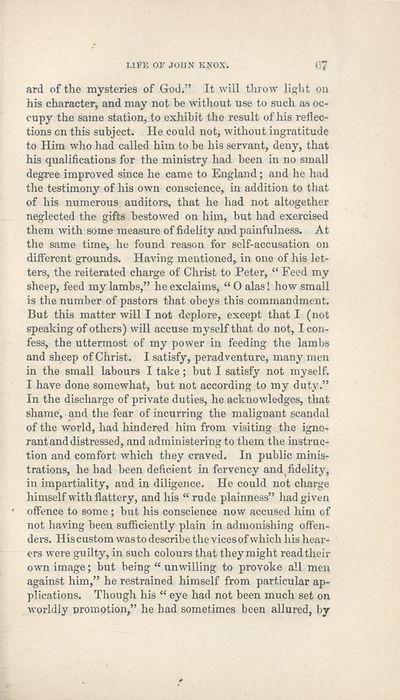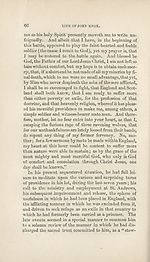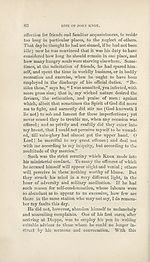Download files
Complete book:
Individual page:
Thumbnail gallery: Grid view | List view

I.IFE OF JOHN KNOX.
ard of the mysteries of God.” It will throw light on
his character, and may not be without use to such as oc¬
cupy the same station, to exhibit the result of his reflec¬
tions cn this subject. He could not, without ingratitude
to Him who had called him to be his servant, deny, that
his qualifications for the ministry had been in no small
degree improved since he came to England; and he had
the testimony of his own conscience, in addition to that
of his numerous auditors, that he had not altogether
neglected the gifts bestowed on him, but had exercised
them with some measure of fidelity and painfulness. At
the same time, he found reason for self-accusation on
different grounds. Having mentioned, in one of his let¬
ters, the reiterated charge of Christ to Peter, “ Feed my
sheep, feed my lambs,” he exclaims, “ 0 alas! how small
is the number of pastors that obeys this commandment.
But this matter will I not deplore, except that I (not
speaking of others) will accuse myself that do not, I con¬
fess, the uttermost of my power in feeding the lambs
and sheep of Christ. I satisfy, peradventure, many men
in the small labours I take; but I satisfy not myself.
I have done somewhat, but not according to my duty.”
In the discharge of private duties, he acknowledges, that
shame, and the fear of incurring the malignant scandal
of the world, had hindered him from visiting the igno¬
rant and distressed, and administering to them the instruc¬
tion and comfort which they craved. In public minis¬
trations, he had been deficient in fervency and> fidelity,
in impartiality, and in diligence. He could not charge
himself with flattery, and his “ rude plainness” had given
offence to some ; but his conscience now accused him of
not having been sufficiently plain in admonishing offen¬
ders. Hiscustom was to describe the vices of which his hear¬
ers were guilty, in such colours that they might read their
own image; but being “ unwilling to provoke all men
against him,” he restrained himself from particular ap¬
plications. Though his “ eye had not been much set on
worldly promotion,” he had sometimes been allured, by
ard of the mysteries of God.” It will throw light on
his character, and may not be without use to such as oc¬
cupy the same station, to exhibit the result of his reflec¬
tions cn this subject. He could not, without ingratitude
to Him who had called him to be his servant, deny, that
his qualifications for the ministry had been in no small
degree improved since he came to England; and he had
the testimony of his own conscience, in addition to that
of his numerous auditors, that he had not altogether
neglected the gifts bestowed on him, but had exercised
them with some measure of fidelity and painfulness. At
the same time, he found reason for self-accusation on
different grounds. Having mentioned, in one of his let¬
ters, the reiterated charge of Christ to Peter, “ Feed my
sheep, feed my lambs,” he exclaims, “ 0 alas! how small
is the number of pastors that obeys this commandment.
But this matter will I not deplore, except that I (not
speaking of others) will accuse myself that do not, I con¬
fess, the uttermost of my power in feeding the lambs
and sheep of Christ. I satisfy, peradventure, many men
in the small labours I take; but I satisfy not myself.
I have done somewhat, but not according to my duty.”
In the discharge of private duties, he acknowledges, that
shame, and the fear of incurring the malignant scandal
of the world, had hindered him from visiting the igno¬
rant and distressed, and administering to them the instruc¬
tion and comfort which they craved. In public minis¬
trations, he had been deficient in fervency and> fidelity,
in impartiality, and in diligence. He could not charge
himself with flattery, and his “ rude plainness” had given
offence to some ; but his conscience now accused him of
not having been sufficiently plain in admonishing offen¬
ders. Hiscustom was to describe the vices of which his hear¬
ers were guilty, in such colours that they might read their
own image; but being “ unwilling to provoke all men
against him,” he restrained himself from particular ap¬
plications. Though his “ eye had not been much set on
worldly promotion,” he had sometimes been allured, by
Set display mode to:
![]() Universal Viewer |
Universal Viewer | ![]() Mirador |
Large image | Transcription
Mirador |
Large image | Transcription
| Antiquarian books of Scotland > Scotland/Scots > Life of John Knox ; and, The life of Alexander Henderson > (85) |
|---|
| Permanent URL | https://digital.nls.uk/131833324 |
|---|
| Description | Thousands of printed books from the Antiquarian Books of Scotland collection which dates from 1641 to the 1980s. The collection consists of 14,800 books which were published in Scotland or have a Scottish connection, e.g. through the author, printer or owner. Subjects covered include sport, education, diseases, adventure, occupations, Jacobites, politics and religion. Among the 29 languages represented are English, Gaelic, Italian, French, Russian and Swedish. |
|---|

